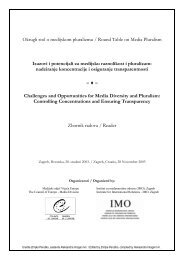almanac on security sector oversight in the Western Balkans
almanac on security sector oversight in the Western Balkans
almanac on security sector oversight in the Western Balkans
You also want an ePaper? Increase the reach of your titles
YUMPU automatically turns print PDFs into web optimized ePapers that Google loves.
<strong>in</strong>stituti<strong>on</strong>s f<strong>in</strong>anced by taxpayers (unless <strong>the</strong>y are c<strong>on</strong>tracted by public <strong>in</strong>stituti<strong>on</strong>s).<br />
Statutory actors operate under a social c<strong>on</strong>tract with citizens and <strong>the</strong>refore have a<br />
greater obligati<strong>on</strong> to make <strong>in</strong>formati<strong>on</strong> available <strong>on</strong> <strong>the</strong>ir functi<strong>on</strong><strong>in</strong>g. Similarly, it<br />
would be po<strong>in</strong>tless to expect that citizens will participate <strong>in</strong> creat<strong>in</strong>g and implement<strong>in</strong>g<br />
<strong>the</strong> <strong>security</strong> policies of private <strong>security</strong> companies, as <strong>the</strong>se are commercial n<strong>on</strong>statutory<br />
agencies. Moreover, under <strong>the</strong> actor-based model, apply<strong>in</strong>g <strong>oversight</strong> criteria<br />
to <strong>oversight</strong> bodies <strong>the</strong>mselves (e.g. parliament, <strong>the</strong> judiciary, <strong>the</strong> executive and<br />
<strong>in</strong>dependent state authorities or CSOs) less accurately measures <strong>the</strong> primary goal of<br />
SSR – effective c<strong>on</strong>trol over <strong>security</strong> providers. Our research was <strong>in</strong>terested <strong>in</strong> determ<strong>in</strong><strong>in</strong>g<br />
whe<strong>the</strong>r <strong>oversight</strong> bodies perform <strong>the</strong>ir <strong>oversight</strong> role, ra<strong>the</strong>r than whe<strong>the</strong>r<br />
or not <strong>the</strong>y are under some<strong>on</strong>e else’s <strong>oversight</strong>. The sec<strong>on</strong>d justificati<strong>on</strong> for <strong>the</strong> shift<br />
from an actor-based to a <strong>sector</strong>al approach is that <strong>the</strong> <strong>sector</strong>-wide approach more<br />
realistically captures <strong>the</strong> aim to provide human <strong>security</strong> as an outcome delivered to<br />
<strong>in</strong>dividual citizens, irrespective of providers. Human <strong>security</strong> is reflected <strong>in</strong> feel<strong>in</strong>gs of<br />
safety and trust that citizens perceive through <strong>the</strong> <strong>in</strong>terplay of multiple <strong>in</strong>stituti<strong>on</strong>s.<br />
For example, <strong>the</strong> methodology no l<strong>on</strong>ger <strong>in</strong>structed researchers to assess separately<br />
<strong>the</strong> quality of human rights protecti<strong>on</strong> by <strong>the</strong> police, military, <strong>in</strong>telligence services etc.,<br />
but to assess <strong>on</strong>e grade for <strong>the</strong> quality of human rights protecti<strong>on</strong> over of <strong>the</strong> entire<br />
<strong>security</strong> <strong>sector</strong>. The improved methodology was <strong>in</strong>spired by a holistic approach to <strong>security</strong><br />
<strong>sector</strong> reform, which treats human and nati<strong>on</strong>al <strong>security</strong> as equal goals of <strong>security</strong><br />
policy while acknowledg<strong>in</strong>g <strong>the</strong> c<strong>on</strong>tributi<strong>on</strong> of both n<strong>on</strong>-state and traditi<strong>on</strong>al<br />
state actors <strong>in</strong> <strong>the</strong> implementati<strong>on</strong> of <strong>the</strong>se goals.<br />
Data was still collected for each actor (as <strong>in</strong> previous research) and next aggregated<br />
based <strong>on</strong> comm<strong>on</strong> trends, with an overall grade presented for each criteri<strong>on</strong>. Data<br />
aggregati<strong>on</strong> was d<strong>on</strong>e accord<strong>in</strong>g to a generic grad<strong>in</strong>g format, described <strong>in</strong> greater<br />
detail below. While collect<strong>in</strong>g and <strong>in</strong>terpret<strong>in</strong>g data, <strong>the</strong> researchers respected unique<br />
features of actors at <strong>the</strong> level of <strong>in</strong>dividual <strong>in</strong>dicators (for example, differentiat<strong>in</strong>g<br />
between <strong>the</strong> desired levels of transparency am<strong>on</strong>g agencies with vastly different functi<strong>on</strong>s).<br />
Additi<strong>on</strong>ally, differences <strong>in</strong> <strong>the</strong> depth and quality of <strong>oversight</strong> exercised over<br />
specific <strong>in</strong>stituti<strong>on</strong>s are expla<strong>in</strong>ed <strong>in</strong> narratives which accompany grades. With<strong>in</strong> <strong>the</strong>se<br />
narratives, certa<strong>in</strong> ‘champi<strong>on</strong>s’ and ‘worst students’ are identified and supported with<br />
evidence, for advocacy purposes.<br />
Thus, <strong>in</strong> <strong>the</strong> sec<strong>on</strong>d cycle of <strong>the</strong> project (2009–2011), <strong>the</strong> methodology was enhanced<br />
<strong>in</strong> two tracks: firstly, new research procedures were developed to improve <strong>the</strong> validity<br />
of results; sec<strong>on</strong>dly, <strong>the</strong> Index underwent empirical f<strong>in</strong>e-tun<strong>in</strong>g through its applicati<strong>on</strong><br />
not <strong>on</strong>ly <strong>in</strong> Serbia but <strong>in</strong> research throughout <strong>the</strong> <strong>Western</strong> <strong>Balkans</strong>. The ‘Index<br />
of SSR’ was shared and tested by six partner th<strong>in</strong>k-tanks 217 <strong>in</strong> <strong>the</strong> regi<strong>on</strong>al comp<strong>on</strong>ent<br />
of <strong>the</strong> study, which resulted <strong>in</strong> <strong>in</strong>dividual publicati<strong>on</strong>s <strong>on</strong> SSR <strong>in</strong> each of <strong>the</strong> respective<br />
<strong>Western</strong> Balkan countries. 218 While <strong>in</strong> this publicati<strong>on</strong> <strong>the</strong> research f<strong>in</strong>d<strong>in</strong>gs are<br />
not presented <strong>in</strong> a comparative manner, standardised methodology was used by <strong>the</strong><br />
217 For this purpose, BCSP delivered tra<strong>in</strong><strong>in</strong>g sessi<strong>on</strong>s dur<strong>in</strong>g which <strong>the</strong> Index of SSR and results of<br />
country studies were reviewed. Between tra<strong>in</strong><strong>in</strong>g sessi<strong>on</strong>s, BCSP and DCAF staff members were <strong>in</strong><br />
charge of research coord<strong>in</strong>ati<strong>on</strong> and provisi<strong>on</strong> of mentorship to participat<strong>in</strong>g CSOs.<br />
218 Includ<strong>in</strong>g a ‘C<strong>on</strong>text Analysis of SSR’ published <strong>in</strong> each country and this volume.<br />
246



